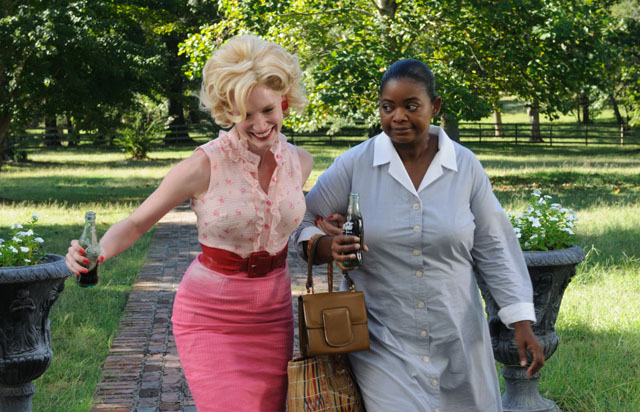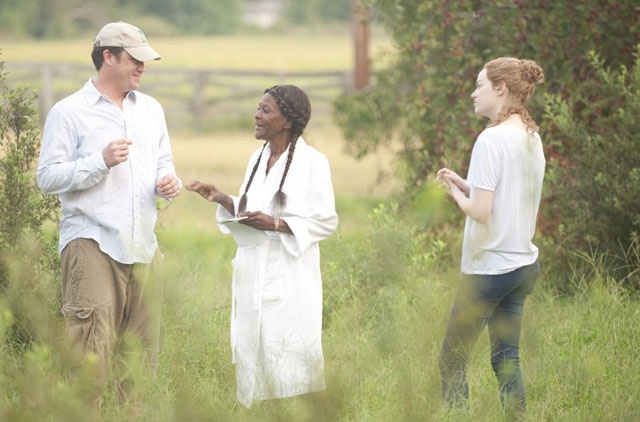CHICAGO – In anticipation of the scariest week of the year, HollywoodChicago.com launches its 2024 Movie Gifts series, which will suggest DVDs and collections for holiday giving.
Interviews: ‘The Help’ Director Tate Taylor, Star Octavia Spencer
CHICAGO – The search for the right actress to portray the pivotal role of Minny in the new film “The Help” ended with Octavia Spencer. The veteran performer was key in expressing the particulars of the character, which was enhanced by director Tate Taylor.
Both Spencer and Tate were in town recently to promote The Help, each expressing their path to the film. Octavia Spencer has been working since the 1990s, best known for playing Constance Grady on the TV series “Ugly Betty.” Tate Taylor is also an actor, and had previously directed only one other feature (”Pretty Ugly People”) before landing the job of adapting Kathryn Stockett’s bestselling novel into a screenplay, and then directing the stellar cast.
 Photo credit: Dale Robinette for DreamWorks Pictures |
HollywoodChicago talked to Octavia Spencer and Tate Taylor together, and each of them had insights to that other place and time called Jackson, Mississippi, circa early 1960s, in the film called The Help.
HollywoodChicago.com: Tate, besides the characters of the book, what fascinated you about the time period and setting of ‘The Help,’ and what did you best want to communicate about that time and place?
Tate Taylor: Besides being a tribute to the woman who helped raised me, who was named Carol Lee, it was getting into these women’s lives and telling their stories, beyond the surface level of just working in houses. Being from Jackson, Mississippi, I would always go on tours of the old homes there. I love going back in time, and the only time you can really do that is on a movie set. It was a lot of fun.
Octavia Spencer: I’m glad he liked going back in time. If he goes back to when I was a queen, that’s all right. [laughs]
HollywoodChicago.com: You grew up in America in a different era as an African American, but in a very similar part of the country as Minny. What do you think is the main difference between you and Minny in the way they felt about themselves, given the America around them?
Spencer: I born in the 1970s and grew up in the ‘80s, so her type of oppression preceded me. The only similarities between my life and Minny’s, now as a woman I know what it’s like to be hot, hungry and heavy. [laughs] Seriously, I honestly think it would be a disservice to the characters of Aibileen and Minny for me to even compare my situation. We were from humble beginnings so maybe I know what it’s like to not have things, but I can’t say beyond that there are any similarities.
HollywoodChicago.com: Tate, when you first got the assignment to adapt the book for the screen, what part of novel did you feel best defined the whole feeling of the story?
Taylor: For me, what really sums it all up, bringing in class, social pressures, racism, loyalty and love, is when Skeeter’s mother has to tell the truth to her about what happened to her childhood caregiver Constantine. It’s in that moment, when Skeeter confronts her, that you see Charlotte did care in some way for Constantine, but the complications of social status and race were a time bomb.
HollywoodChicago.com: Octavia, besides the novel, what books, films or sources helped you to get an idea of Minny’s life in the early 1960s? Did you talk with actual maids?
Spencer: When I was younger, my mother wanted us to be educated about the world we had been born into. The best way to do that is to show us ‘Eyes on the Prize’ [PBS documentary about the civil rights movement]. It was so earth-shattering to me at the time, that I thought I could never watch it again. But when I knew I was going to do this period film, I told Tate to watch it and I watched it again. Tate then came across another documentary, ‘Yes, M’am,’ and he made sure every actress forty and under got both of those documentaries.
We both had the pleasure and honor of meeting Myrlie Evers Williams [widow of slain civil rights leader Medgar Evers]. I had extensive conversations with her about what it was like. Part of the strength in Minny I modeled after my own mother, but I put a little Miss Myrlie in there, too.
HollywoodChicago.com: Tate, what do you think is most misunderstood about the “villains” in The Help, people like Hilly Holbrook?
Taylor: Most people understand villains as inherently evil people. I don’t think Hilly came out of the womb hating or wanting to put down people, whether it’s whites in lower social classes or African Americans. It’s just that she hasn’t expanded her brain or life beyond the bubble she lives in. She truly doesn’t know anything, it’s just ignorance. Also I think Hilly is an insecure and lonely person, and in that sense she’s looking for others to put down. Like most people who are villains, it’s about them and what is not about them.
HollywoodChicago.com: Octavia, in your observation, what does America still need to do to continue to eradicate racist attitudes that still are prevalent 50 years after the period depicted in The Help?
Spencer: This may sound hokey, but I love that phrase ‘change begins with a whisper.’ [a tagline for the movie] That whisper is usually within yourself. Only when you find the courage to say something to someone that might influence a change in your behavior, does that behavior change. The other thing is to educate yourself about other people. We know longer live in a homogenous society, it is not black, white, Asian or Latin, it is a melting pot. Until we learn to assimilate and learn about other cultures, we will continue to have racism problems. Of course, there are other ‘-isms’ as our ills. We have sexism, ageism, elitism, homophobia-ism, there are many -isms we have to overcome.
 Photo credit: Dale Robinette for DreamWorks Pictures |
HollywoodChicago.com: Tate, while filming on location The Help, what did you observe about the Jackson, Mississippi, of today that surprised or charmed you?
Taylor: We only filmed two days in Jackson, we were mostly in Greenwood, Mississippi. But I can speak about Mississippi as a whole…as a Mississippian our guard is always up when films like this are shot and books like this are written, because it is a prominent part of our history. It always feels like a scab is being picked when you’re from Mississippi – ‘here we go again, back to the bad old days.’
I felt that, but as I was writing the screenplay I also thought, well, it’s the truth. I can’t sugarcoat it, this is the backdrop. I was a little nervous coming to the state, I was expecting people in Greenwood to roll their eyes and not welcome us, because we were reminding them of the past. But it was the opposite. I’m not saying that the South is healed and completely changed, but I had to go to the University of Mississippi to ask permission to put Ole Miss in the movie, and also the Junior League of Jackson. Everyone in the state is so proud of where they have slowly come, that the response was this film was showing the good and the bad things about the state, but it’s all true.
Spencer: It’s very seldom that we see the good of the South. There is a perception that Southerners are racists and everyone else in the nation is ‘enlightened.’ There is racism everywhere, and there is good everywhere, and what I love about this project is that it shows a balance.
HollywoodChicago.com: What kind of different perspective on history has emerged for you after researching, understanding and portraying Milly?
Spencer: For me, Minny made me realize that the generations after the civil rights movement have so much to be grateful for, but yet I don’t think in genral we know that gratitude. I studied the civil rights movement, but there is one thing about knowing history, and another in recreating it. When you recreate the oppression, and what people had to surmount, just to be able to achieve a level of success that we have access to now, I think the film becomes important just because it puts that information out there. I realized in walking in Minny’s shoes, I had very small feet.
HollywoodChicago.com: Tate, what is different in your approach as a director, because you’ve been on the other side of the camera as an actor?
Taylor: I like actors, I like acting, I’m an actor’s director. I’ve been there and the whole reason I am a director is that I was in the Groundlings [improvisation troupe] in Los Angeles. Part of the process in the group is that you learn writing, acting and directing at the same time. That was the greatest gift I could receive, because they all go together.
To write, you have to know how to act and know about directing. To act, you also need to know how to write and direct. So when I’m on the set it gives me a freedom to talk to an actor and have street credibility. When I tell them to change it up, they understand, and when they come to me as an actor and say they’re not feeling it, I don’t have to ask why, I just want to get it and make it work.
Spencer: Also since Tate is an actor, he also knows which terms not to use, the vague terms like ‘I need you to be bigger.’ He gave us concrete direction to work
HollywoodChicago.com: Finally, this is for both of you. Do you think that the America of 1964 would have welcomed a book like The Help as it was presented, or do you think in reality it still wasn’t ready for it?
Taylor: In 1964, had this book been real? Hell, no! Jackson would have loved the gossip aspect of it, but I think it would have been discounted because African Americans had something to do with it. They may have enjoyed it, but they probably wouldn’t have given it any merit.
Spencer: I don’t know, I think people who are inclined to have an open mind are the type of people who would either agree with the material or not. I think the book would have been as receptive to those who had open minds back then. I’m a realist, but in this case maybe I’m being an optimist.
 | By PATRICK McDONALD |


